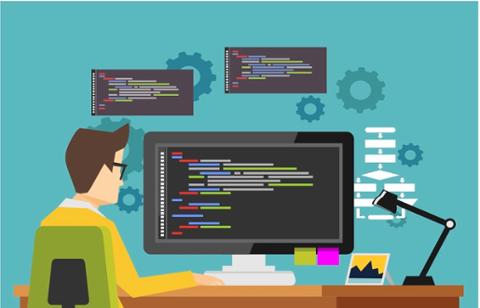
Websites and applications power our lives, which means that skilled web developers are always in high demand. For those who master web developer skills and tools, there’s a rewarding career path with competitive salaries, interesting opportunities, and the potential for significant growth.
But what does it take to actually become a web developer? What skills do you need to learn? Which tools to master? Let’s break down essential skills, explore the various learning paths available, and offer practical advice on building a strong portfolio and landing your dream job.
What is Web Development?
Let’s start with the most fundamental thing: web development encompasses the entire process of creating and maintaining websites and web applications. It's a multifaceted field that can be broadly categorized into three key areas:
Front-End Development
This area focuses on the user interface (UI) and user experience (UX) of a website – what users see and interact with. Front-end developers utilize a combination of technologies to create visually appealing and intuitive websites.
- Key Technologies: HTML (for structuring content), CSS (for styling and layout), JavaScript (for adding interactivity and dynamic behavior).
- Essential Skills:
- Responsive Design: Creating websites that adapt seamlessly to different screen sizes (desktops, tablets, and mobile devices).
- Accessibility: Designing websites that are usable by people with disabilities (e.g., screen reader compatibility).
- UI/UX Principles: Understanding user psychology and designing intuitive user interfaces.
Back-End Development
This area deals with the server-side logic and infrastructure of a website. Back-end developers work behind the scenes to ensure that websites function smoothly and efficiently.
- Key Technologies:
- Programming Languages: Python (with frameworks like Django and Flask), Node.js (with frameworks like Express), Ruby (with frameworks like Ruby on Rails), Java.
- Databases: SQL (Structured Query Language) for interacting with relational databases.
- APIs (Application Programming Interfaces): Communicating with external services and data sources.
- Essential Skills:
- Data Structures and Algorithms: Understanding fundamental computer science concepts.
- API Integration: Connecting different software systems and services.
- Security Best Practices: Implementing measures to protect websites from cyber threats.
Full-Stack Development
As the name suggests, full-stack developers possess expertise in both front-end and back-end development. They have a holistic understanding of the entire web development process, allowing them to work effectively on all aspects of a project.
Why Choose a Career in Web Development?
Many web developers choose to specialize in either front-end, back-end, or full-stack development. Whatever your chosen path, a career in web development offers a compelling blend of creativity, problem-solving, and technological innovation. Here are some key reasons why it's an attractive career path:
- High Demand: The digital world is constantly expanding, and businesses of all sizes rely heavily on websites and web applications. This creates a strong demand for skilled web developers.
- Competitive Salaries: Web development is a well-compensated field, with salaries varying based on experience, location, and specialization. According to Dice’s latest Tech Salary Report, the average software developer earns $128,386 per year.
- Remote Work Opportunities: The nature of web development often allows for remote work, providing flexibility and work-life balance.
- Continuous Learning and Growth: The tech industry is constantly evolving, requiring web developers to continuously learn new technologies and best practices. This fosters a dynamic and intellectually stimulating work environment.
- Creative Expression: Web development allows you to bring your creative vision to life by designing and building engaging and user-friendly websites and applications.
Essential Skills for Web Developers
Beyond technical expertise, successful web developers possess a unique blend of hard and soft skills:
Programming Languages
- Core:
- HTML: The foundation of all web pages, used to structure content.
- CSS: Used to style and layout web pages, controlling the visual appearance.
- JavaScript: A versatile language that adds interactivity and dynamic behavior to websites.
- Additional Skills:
- Python: A widely used language for back-end development, data science, and machine learning.
- Java: A robust and versatile language used for enterprise applications and Android development.
- PHP: A popular language for server-side scripting and dynamic website development.
Frameworks and Libraries
- Front-End: React, Angular, Vue.js (popular JavaScript frameworks)
- Back-End: Django (Python), Express.js (Node.js), Ruby on Rails
Soft Skills
- Problem-Solving: Debugging code, identifying and resolving technical issues.
- Communication: Effectively communicating with clients, colleagues, and stakeholders.
- Teamwork: Collaborating effectively with designers, project managers, and other developers.
- Adaptability: Staying current with the latest technologies and industry trends.
- Attention to Detail: Ensuring code quality, accuracy, and pixel-perfect design.
Education and Certifications
While a formal computer science degree can be beneficial, it's not always a strict requirement for becoming a web developer. Here are some effective learning paths:
Self-Learning:
- Online Courses: Platforms like Coursera, Udemy, edX, and freeCodeCamp offer a wide range of web development courses, from beginner to advanced levels.
- Online Resources: Utilize online documentation, tutorials, and communities (like Stack Overflow) to learn and troubleshoot.
- Personal Projects: Build personal projects to apply your knowledge and gain practical experience.
Bootcamps
- Immersive Programs: Intensive, short-term programs that provide fast-paced, hands-on training in web development fundamentals.
- Benefits: Practical, project-based learning, career services, and networking opportunities.
Certifications
- Industry-Recognized Certifications:
- Google IT Support Professional Certificate: Foundational IT skills, including networking, cybersecurity, and operating systems.
- AWS Certified Cloud Practitioner: Basic AWS cloud computing knowledge.
- CompTIA A+: Entry-level IT certifications covering hardware, software, and troubleshooting.
Steps to Become a Web Developer
While there are many possible paths for someone to successfully become a web developer, here are some techniques that can work for pretty much anyone looking for a career in web development:
Choose a Learning Path
- Select the learning path that best suits your learning style and career goals (self-study, bootcamp, or a combination).
Master the Fundamentals
- Focus on core web development concepts: HTML, CSS, and JavaScript.
Build a Strong Foundation
- Learn a Back-End Language: Choose a language like Python, Node.js, or Ruby and delve into its syntax, libraries, and frameworks.
- Explore Front-End Frameworks: Learn a popular front-end framework like React, Angular, or Vue.js to enhance your front-end development skills.
Develop Practical Skills
- Build Real-World Projects: Create personal projects (e.g., personal websites, e-commerce stores, social media applications) to apply your knowledge and build your portfolio.
- Contribute to Open-Source Projects: Collaborate with other developers on open-source projects to gain real-world experience and build your network.
Master Essential Tools
- Version Control: Learn Git and GitHub for tracking code changes and collaborating effectively.
- Integrated Development Environments (IDEs): Utilize IDEs like Visual Studio Code, Sublime Text, or Atom for efficient coding.
- Browser Developer Tools: Familiarize yourself with browser developer tools for debugging, inspecting elements, and analyzing website performance.
Build a Compelling Portfolio
- Showcase Your Best Work: Create a professional portfolio website to showcase your projects and highlight your skills.
- Tailor Your Portfolio: Customize your portfolio to target specific job roles and industries.
Gain Experience
- Internships: Gain practical experience in a real-world setting.
- Freelancing: Build your skills and client base by taking on freelance projects.
- Networking: Attend industry events, connect with other developers, and build your professional network.
Job Search
- Identify Job Opportunities: Utilize job boards, company websites, and networking to find suitable web development roles.
- Prepare for Interviews: Practice technical questions, behavioral questions, and prepare a strong cover letter and resume.
Tools and Resources for Web Developers
If you want to become a successful web developer, it’s also critical to become familiar with the following tools:
- Code Editors:
- Visual Studio Code: A powerful and versatile code editor with extensive extensions.
- Sublime Text: A lightweight and highly customizable code editor.
- Version Control Systems: Git, GitHub
- Testing and Debugging Tools:
- Browser Developer Tools: Chrome DevTools, Firefox Developer Tools
- Testing Frameworks: Jest, Mocha, Selenium
- Learning Platforms:
- freeCodeCamp, MDN Web Docs, Coursera, Udemy, edX
- Communication and Collaboration: Slack, Microsoft Teams
Career Opportunities and Specializations
Web development offers a diverse range of career paths and specializations. For example, if you master the fundamentals of web development and decide you really like the design aspects, you can become a UI/UX designer. Here are some career opportunities to explore:
Front-End Developer
- Focus on the user interface (UI) and user experience (UX) of websites.
- Responsibilities:
- Designing and developing visually appealing and user-friendly interfaces.
- Implementing interactive elements and animations.
- Ensuring cross-browser compatibility and accessibility.
Back-End Developer
- Focus on the server-side logic and infrastructure of websites.
- Responsibilities:
- Building and maintaining APIs and databases.
- Ensuring website security and performance.
- Implementing server-side logic and business rules.
Full-Stack Developer
- Possess expertise in both front-end and back-end development.
- Responsibilities:
- Working on all aspects of a web development project, from design and development to deployment and maintenance.
- Adapting to different technologies and project requirements.
Webmaster
- Responsible for the overall maintenance and management of a website.
- Responsibilities:
- Ensuring website uptime and security.
- Managing website content and updates.
- Troubleshooting technical issues and resolving user problems.
UX/UI Designer
- Focus on the user experience and user interface design of websites and applications.
- Responsibilities:
- Conducting user research and creating user personas.
- Designing wireframes, mockups, and prototypes.
- Ensuring that websites are user-friendly, accessible, and visually appealing.
DevOps Engineer
- Focus on automating and streamlining the software development and deployment process.
- Responsibilities:
- Building and maintaining the infrastructure that supports web applications.
- Automating tasks such as testing, deployment, and monitoring.
- Ensuring the smooth and efficient operation of web applications.
Mobile App Developer
- Focus on developing applications for mobile devices (iOS and Android).
- Responsibilities:
- Designing and developing mobile applications using native languages (Swift, Kotlin) or cross-platform frameworks (React Native, Flutter).
- Ensuring the performance and user experience of mobile applications.
Challenges in Web Development
While web development offers a rewarding career, it also presents its own set of challenges:
- Rapid Technological Advancements: The web development landscape is constantly evolving, requiring continuous learning and adaptation to new technologies and best practices.
- Problem-Solving: Debugging code, troubleshooting issues, and identifying and resolving technical challenges can be time-consuming and require strong problem-solving skills.
- Staying Competitive: The web development field is competitive, requiring developers to continuously improve their skills and build a strong portfolio to stand out from the crowd.
- Maintaining Work-Life Balance: The fast-paced nature of web development can sometimes lead to burnout, making it important to prioritize work-life balance and self-care.
Conclusion
A career in web development offers a dynamic and rewarding path for those passionate about technology and eager to contribute to the ever-evolving digital landscape. By following a structured learning path, building a strong portfolio, and continuously honing your skills, you can successfully embark on your journey to becoming a skilled and successful web developer.
FAQs
Q: What qualifications do I need to become a web developer?
A: While a formal computer science degree can be beneficial, it's not always a strict requirement. Strong programming skills, a solid understanding of web development fundamentals, and a well-crafted portfolio are key.
Q: How long does it take to become a web developer?
A: The time required varies depending on your learning pace, chosen learning path, and career goals. It typically takes 6-12 months of focused learning and practice to develop the necessary skills for entry-level web development roles.
Q: Is web development a good career?
A: Yes, web development offers a rewarding career path with high demand, competitive salaries, and opportunities for growth and advancement.
Q: What's the difference between a web designer and a web developer?
A: Web designers focus on the visual aspects of a website, including aesthetics, user interface (UI), and user experience (UX). Meanwhile, web developers focus on the technical aspects of website creation, such as coding, programming, and ensuring website functionality.


